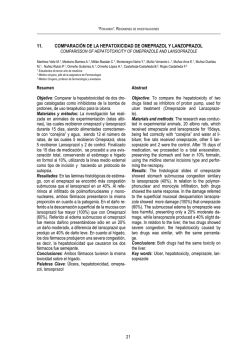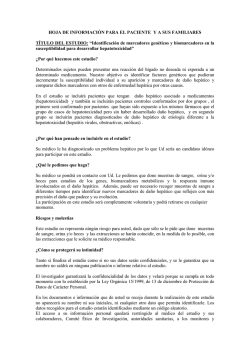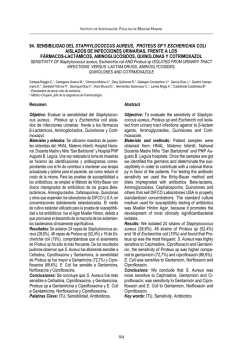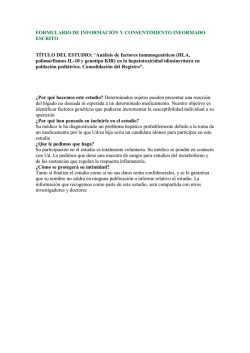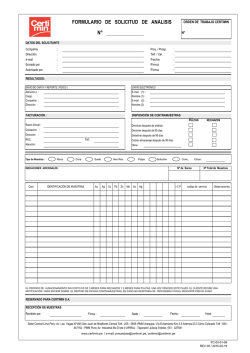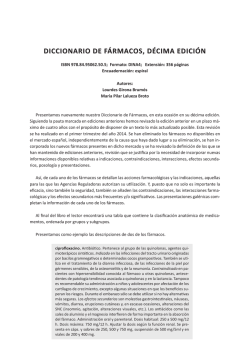
Descarga PDF
Instituto de Investigación. Facultad de Medicina Humana 60. EVALUACIÓN DE LA HEPATOTOXICIDAD POR EL USO DE ASOCIACIONES DE QUINOLONAS Y FENAZOPIRIDINA EN EL TRATAMIENTO DE INFECCIONES DEL TRACTO URINARIO HEPATOTOXICITY ASSESSMENT OF THE USE OF QUINOLONS AND PHENAZOPYRIDINE ASSOCIATIONS IN THE TREATMENT OF URINARYTRACT INFECTIONS Acuña Barrueto J.1, Arata Azcárate C.1, Briceño Clemens D.1, Bucher Oliva A.1, Cajo Gómez F.1, Coloma Salas R.1, Daly Turcke A.1, Diaz Piccone M.1, Fiorini Talavera J.1, Gálvez Vargas J.1, Gomero Ulloa R.1, Vega Barandiarán J.1, Castañeda B.2 1 Estudiantes de tercer año de Medicina. 2 Jefe de la Asignatura de Farmacología. Resumen Abstract Objetivo: Evaluar la hepatotoxicidad por el uso de asociaciones de Quinolonas y fenazopiridina en el tratamiento de infecciones del tracto urinario. Materiales y métodos: Se distribuyeron en tres grupos homogéneos: Control, CF (ciprofloxacina con fenazopiridina), NF (norfloxacina con fenazopiridina). Durante siete días se les administró los fármacos correspondientes a las 8 de la mañana y a las 6 de la tarde, después se les suministró alimentos húmedos, purina y agua. El primer día de administración se tomaron las tres primeras muestras, una de cada grupo, antes de la primera aplicación. Las siguientes muestras se tomaron al cuarto, sexto y octavo día antes de la aplicación de las 8 de la mañana. Luego de tomar las muestras de sangre, se procedió a extraer el hígado de cada una de las ratas los cuales fueron congelados y obtener cortes para el examen patológico y preparar láminas. Previamente se realizó el dosaje de transaminasa pirúvica. Resultados: En el día 7 se observaron microfocos donde hubo destrucción de la membrana del hepatocito a nivel intraparenquimal. Se observó que la asociación de los fármacos: Ciprofloxacina – Fenazopiridina presentó un mayor nivel de hepatotoxicidad, lo cual se aprecia por los altos niveles de transaminasas alcanzados los días 5 y 7 de la administración de dichos fármacos. En la asociación de los fármacos Norfloxacina – Fenazopiridina, la hepatotoxicidad no llegó a niveles de transaminasas como los alcanzados por la asociación ciprofloxacina - fenazopiridina, pero se produjo igualmente un daño considerable a nivel de las membranas celulares tanto en periferia como a nivel centro lobulillar. Conclusiones: La asociación de Ciprofloxacina – Fenazopiridina presentó un mayor nivel de hepatotoxicidad. Palabras Clave: Hepatotoxicidad, Quinolonas, ITU. Objective: To evaluate the hepatotoxicity by the use of Quinolons associated to phenazopyridine in the treatment of urinary tract infections. Materials and methods: Patients were distributed into three homogeneous groups: Control,CF (ciprofloxacin with phenazopyridine), NF (norfloxacinphenazopyridine). During seven days the drugs were administered at 8 am and 6 pm; then the animals fet with purine and water at libitum. The first day of administration we got the first three samples, one for each group before the first application. The following samples were got at the fourth, sixth and eighth day before the application of 8 in the morning. After taking blood samples, we proceeded to extract the liver of each rat which were frozen and get cuts for pathological examination and preparing slides. Previously we did the dosage of pyruvic transaminase. Results: The seventh day we observed microfoci where there was destruction of the hepatocyte membrane intraparenchymal level. We found that the association of drugs: Ciprofloxacin - Phenazopyridine presented a higher level of hepatotoxicity, according wit the high increase of transaminase levels got at 5th and 7th days after drug administration. With the association of Norfloxacin and Phenazopyridine, didn´t increased so much the transaminase seric levels as those achieved by the association of Ciprofloxacin with Phenazopyridine, but there was also considerable damage to cell membranes at both peripheral and central lobular level. Conclusions: The association of Ciprofloxacin and Phenazopyridine presented a higher level of hepatotoxicity. Key words: Hepatotoxicity, quinolones, UTI. 70
© Copyright 2026
